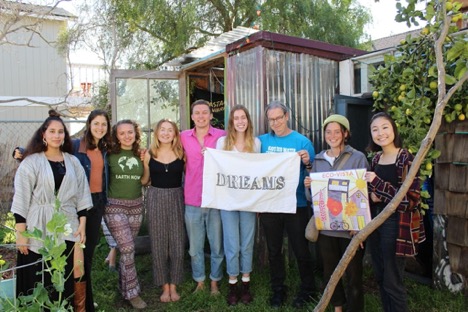News Date:
Content:
Walking around Isla Vista, the neighborhood adjacent to UC Santa Barbara, one can spot recycling bins on every corner and grocery stores entirely focused on sustainable food. Bike racks are more common than regular parking spaces, and most everyone walking by is carrying a reusable water bottle.
For a student moving from Long Beach, a city with a population of close to 500,000, my eyes couldn’t believe it at first. Was this the environmentally-conscious neighborhood of my dreams?
While I was always vaguely interested in sustainability, it had previously remained in my peripheral vision. Cities are busy, right? Everyone is always moving to their next destination, without much care or concern about the environment they are speeding through. I could easily have described myself as the same.
It wasn’t until I took Eco Vista: Creating Systemic Alternatives, a Sociology class at UC Santa Barbara with Prof. John Foran, that I realized environmental activism is easier and more attainable than I could have ever imagined.

Students from the class with Professor John Foran
The course introduces students to a community project called Eco Vista that is transitioning Isla Vista into an “ecovillage,” a community that is purposefully designed to regenerate social and natural environments in social life, culture, ecology, and the economy. The project features initiatives like the Food Forest, where the organization created a community garden. It also collaborates with the Cool Block program, which strives to create a carbon neutral Isla Vista.
The course analyzes the historical background and contemporary situation of Isla Vista, while assessing the state of the existing Eco Vista Project — both the theories and case studies related to achieving deep social transformation.
Our final project was to produce a practical idea stemming from the Eco Vista process. While imaginations ran wild with possibility, we were required to create detailed plans for implementation, logistics, and funding.
With ideas ranging from community gardens to organized beach cleanups, my group focused on a community thrift sale designed to combat the environmentally and financially taxing effects of the move-in/move-out process that communal, short-term living creates. The event would allow for donations and recycling of good-condition household essentials that otherwise would left to landfills while new students bought brand new equipment.
I was thrilled to learn about the on-site composting programs of the aptly named Associated Students Department of Public Worms, who promote sustainable agricultural techniques by educating the community about the importance of composting.
Eco Vista: Creating Systemic Alternatives challenged me to view sustainability in a completely new way. Action I had once been willing to leave left to forest rangers and politicians now felt tangible through real plans I made to help the community I live in and love.
Discovering this passion for environmentalism inspired me to reach out and explore other environmental activism groups in the local community, like the Isla Vista Compost Collective, who collect compost from residents to fertilize a local community garden. It’s incredible to see the strong network of like- minded individuals striving to make Isla Vista more environmentally friendly for the future.
Lily Leventhal is a third-year Communication student at UC Santa Barbara. She wrote this mini-memoir for her Writing Program course Digital Journalism.






